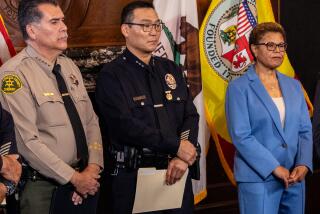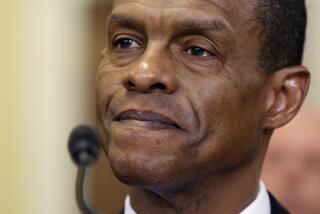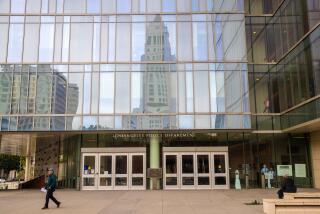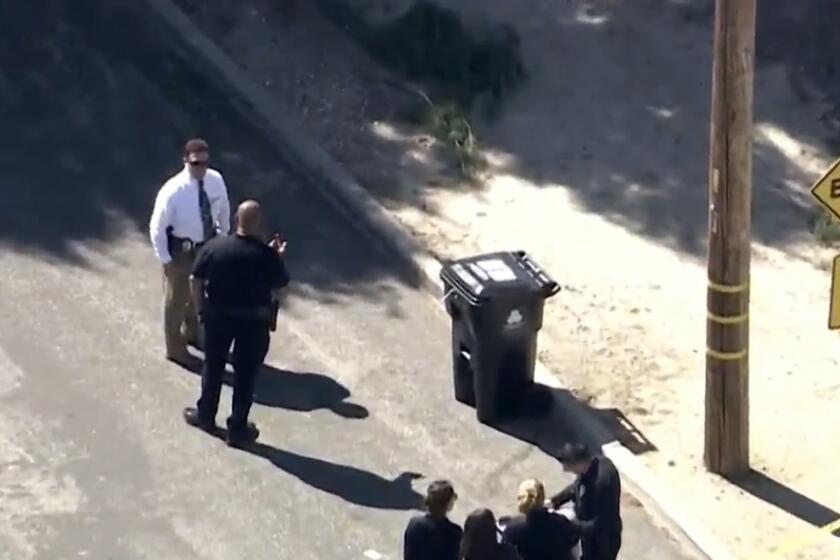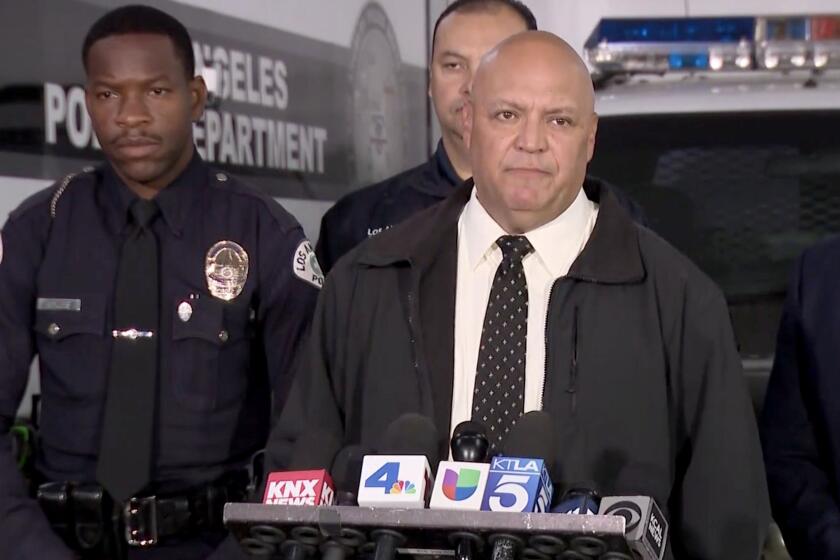Column: LAPD Chief Beck explains why he doesn’t want his officers to be immigration cops
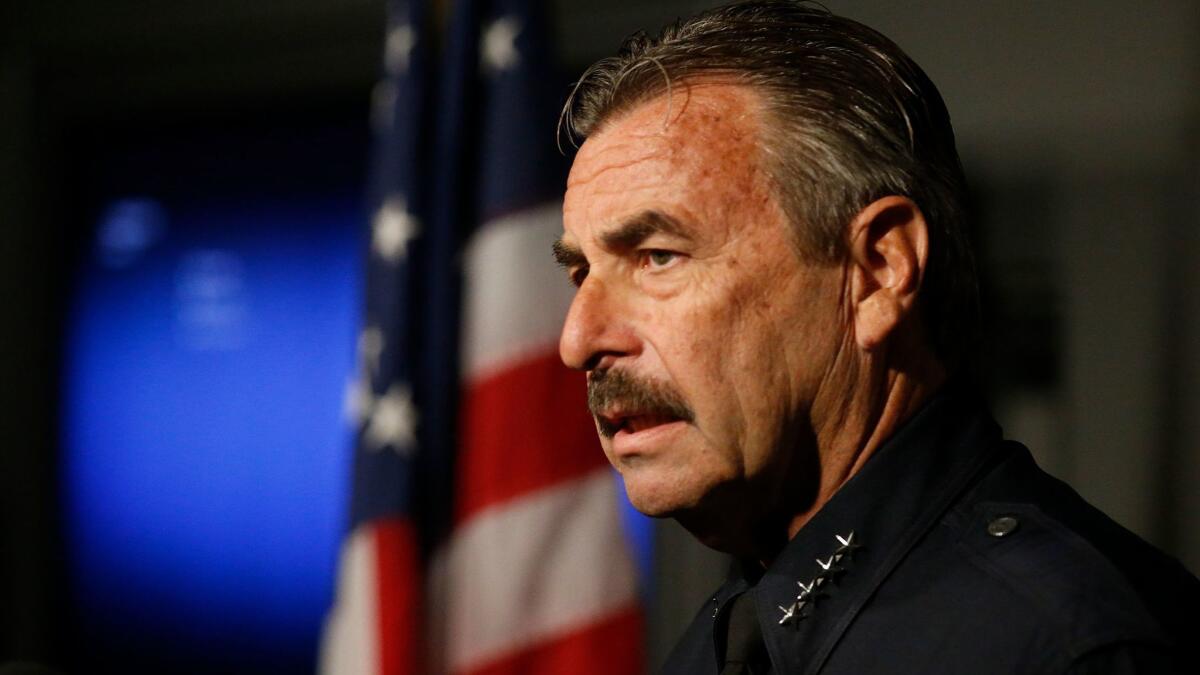
LAPD Chief Charlie Beck and I were chatting over breakfast, and I told him the story of a Border Patrol maintenance man who spent decades repairing holes in the border fence at Calexico.
Some days Albert Garcia welded and patched 10 or 12 holes, finding saws and ropes and ladders near cuts in the iron fence. The next day, he’d go back and find more holes, and patch those, too.
I wrote about Garcia in 2004 and called him last week — he’s retired now — to ask his thoughts on President Trump’s vow to build a wall the length of the border.
“No matter what kind of fence you put in,” Garcia told me, “it’s not going to hold anyone back. It doesn’t matter how high or wide you build it.”
There’s a simple reason for that, Beck said.
“We have a very rich country with a lot of opportunity that is immediately adjacent to a poorer country with less opportunity,” said the chief. It stands to reason that people will risk everything to head north and escape corruption, poverty and drug crime.
No legal or administrative edict can change this, said Beck. He has publicly refused to comply with Trump’s call for police officers to assist federal authorities by detaining undocumented immigrants for deportation.
“That is not our job, nor will I make it our job,” Beck said in November, drawing a line he’s still defending.
Beck is not alone among law enforcement and city officials who’ve taken this position — city leaders from San Francisco to Chicago to New York have pledged to fight Trump’s immigration policies even if it means the loss of federal funding. But Beck stands out among top cops, and has for years, having argued that if undocumented immigrants were to fear deportation, they’d be less inclined to cooperate on criminal investigations.
Is it really all that common for undocumented immigrants to step up as witnesses to crime?
Yes, said Beck. But the issue is bigger than that.
“A lot of people think, well, he’s talking about witnesses to crime, which I am. But I’m also talking about victims of crime,” he said.
Beck cited estimates that about 500,000 residents of Los Angeles are undocumented.
“When you create a shadow population … that fears any interaction” with law enforcement, Beck said, “then you create a whole population of victims, because they become prey for human predators who extort them or abuse them because they know they won’t contact the police.”
Beck, a career cop who is now 63, said he didn’t see it this way when he joined the force. But he evolved as he better understood practical realities and the essence of Los Angeles, which implemented Special Order 40 in 1979 to prevent police from doing the federal work of immigration control.
“In the mid-1990s, when the state cracked down [on] illegal immigration, all we did was drive people underground,” said Beck.
Beck had another awakening just after taking over as chief in 2009.
“My daughter comes home, when she was a young police officer, and I asked how it went at work,” said Beck. “She starts tearing up and I said, ‘What’s the matter, honey.’ ”
His daughter told him about impounding a car in the middle of the night, leaving a pregnant woman and her family to walk through the darkened streets of the Rampart division.
“So that helped me realize we’re doing this wrong,” said Beck. “We have a system set up here that is penalizing people we should be protecting, and that’s when we started to change the impound procedures.”
Beck took a storm of criticism in 2012 on two related issues. He supported provisional driver’s licenses for undocumented immigrants, saying roads would be safer if drivers were regulated. And he implemented a decree that prohibited 30-day impounds of vehicles in some cases, arguing that undocumented immigrants unable to get driver’s licenses were unfairly burdened. Critics howled, and Beck’s own rank and file sued.
Today, Beck said, his force is about 47% Latino, and many officers have what he called blended families. In other words, they’ve got relatives with papers and relatives without. That’s just the way it is, said Beck, because for years, the nation has sent mixed signals on immigration, putting up stop signs while welcoming people into the workforce.
It would be impractical to split families rather than offer some pathway to legal standing, Beck said. A better way to reduce immigration, in his mind, would be to help boost the Mexican economy rather than declare war on a neighbor.
Beck said he grew up in, and raised his kids in, a mixed community. For many years, no one asked about or thought about who had papers and who didn’t, even as the population became more Latino.
“To think the fabric of Los Angeles is going to change [through a legal edict],” Beck said, “denies our history.”
If the LAPD were forced into the immigration business, Beck said, “It’s all we’d do,” instead of focusing on trying to bring crime rates down.
“We couldn’t deport 500,000 people if we wanted to, and if we did, it would be at the expense of public safety.”
If undocumented immigrants are convicted of violent felonies, Beck thinks they should serve their time and then be deported. But the crime rate is no greater among immigrants than the rest of the population, he said.
Beck said he doesn’t want to poke the new president in the eye. But with 40 years of experience, he thinks he understands his city and how to best police it, and he’s not inclined to bow to simple-minded political rhetoric.
But he could risk millions in federal funding, I said, if Trump decides to punish cities that don’t comply.
“I’d risk losing my beliefs,” Beck said if he were to comply. “There’s not a price for me to do this differently.”
To read the article in Spanish, click here
Get more of Steve Lopez’s work and follow him on Twitter @LATstevelopez
MORE FROM STEVE LOPEZ
Scum of the earth lowlife packs a bag for Trump’s inauguration
When it comes to political donations in L.A., what’s legal can be worse than what’s not
If you’d been in the shoes of these immigrants from Mexico, what would you have done?
More to Read
Start your day right
Sign up for Essential California for news, features and recommendations from the L.A. Times and beyond in your inbox six days a week.
You may occasionally receive promotional content from the Los Angeles Times.

